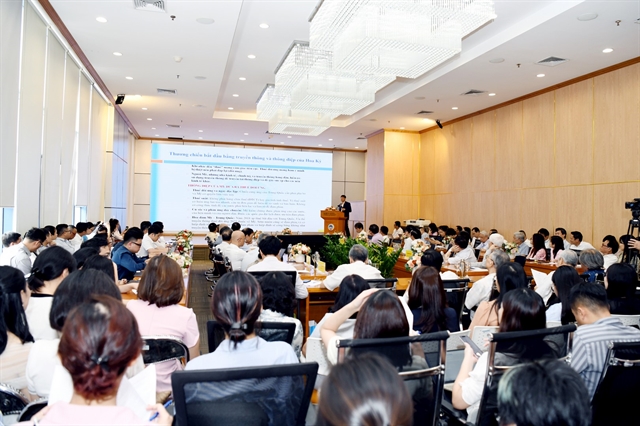VN needs to restructure the economy to increase resilience to global uncertainties amid US tariff change
Forum hears that VN can use this time to stabilise the domestic market and supply chains, maintain the confidence of investors and international partners and turn the crisis into a driver for reform and competitiveness improvement.

HÀ NỘI — It is not only time for Việt Nam to prepare solutions to respond to changes and impacts from the US reciprocal tariff policy, but also an opportunity to restructure the country’s economy to become self-reliant, develop sustainably, and increase resilience to world instability, Professor Dr Nguyễn Thành Hiếu, Deputy Director of the National Economics University, said.
Speaking at a forum titled ‘The US reciprocal tariff policy: Impact and strategic adjustment for Việt Nam’ held in Hà Nội by the National Economics University (NEU) yesterday, Hiếu who is the NEU’s Vice President, said the reciprocal tax measures recently introduced by the US, not only affect major partners such as China and the EU, but also have a chain effect on many other countries, including Việt Nam.
According to Hiếu, currently, the scale of exports from Việt Nam to the US accounts for 30 per cent of total export turnover, and the trade surplus of Việt Nam with the US accounts for more than 20 per cent of the total GDP. In terms of structure, 70 per cent of goods exported to the US are key processed and manufactured goods such as electricity, electronics, components, phones, leather and footwear, textiles and wood. These items are mostly products of the FDI sector, and have also been the driver of the economy in recent years.
“Therefore, this is the time for Việt Nam to prepare solutions to respond to changes and impacts from the new US tariff policy and also an opportunity to restructure the country’s economy to become self-reliant, develop sustainably, and increase resilience to world instability,” Hiếu said.
To minimise the impact of US reciprocal tariffs, Associate Professor Dr Phan Hữu Nghị, Deputy Director of the Institute of Banking and Finance at the National Economics University, said Việt Nam should set specific targets, such as reducing the negative effects on export enterprises. It needs to stabilise the domestic market and supply chains, maintain the confidence of investors and international partners and turn the crisis into a driver for reform and competitiveness improvement.
According to Nghị, precautions, negotiation preparation, and adaptation measures must be implemented before risks become reality to protect businesses and maintain the FDI supply chain.
In the long term, Nghị said, Việt Nam should develop policies to diversify export markets, strengthen regional and global cooperation and avoid dependence on a certain market.
In addition, it is necessary to review the impacts on tax revenue, technology transfer and environmental impacts of corporations and multinational companies in Việt Nam to attract FDI selectively.
“Việt Nam also needs to build a sustainable local economy by investing in infrastructure, training local workers, restoring natural resources and engaging local communities to create an economy that is resilient to external shocks,” Nghị said.
Referring to the adjustment of Việt Nam's trade policy in the context of the US imposing reciprocal tariffs, Associate Professor Dr Tạ Văn Lợi, Principal of the School of Business, National Economics University, said that Việt Nam needs to review the group of goods with trade surplus to the US and negotiate to reduce tax pressure on this group of goods.
For the group of goods of FDI enterprises with trade surplus with the US, it is necessary to review tax policies and tax incentives, considering the impact of the imposition of new taxes. The Government should resolutely eliminate foreign enterprises that pretend to have a trade surplus with the US. For the remaining enterprises, the Government should ensure the committed tax incentives and share the tax burden if possible.
“For the group of goods such as textiles, footwear, wooden furniture and seafood, that Việt Nam has an export surplus with the US, it is necessary to clearly analyse the value chain that Việt Nam benefits from with the new tax value,” Lợi said, adding the country also needs to adjust its comprehensive economic development strategy with a long-term vision, clearly identifying key industries to focus on investment.
As many simple industries and services will be eliminated due to digital transformation and robotics technology, automation and artificial intelligence (AI) in the future, Lợi proposes to choose semiconductor technology, AI, software, digital economy, nuclear and new materials to open the door for US businesses to enter Việt Nam.
In addition, the Government should increase investment to improve the quality of human resources, access world technology more quickly, and focus on attracting FDI with high-quality human resources through transparent and fair policies to improve Việt Nam's participation position in the global supply chain.
Lợi also mentioned some other adaptive solutions, such as encouraging the development of the private economy and changing the approach to trade and investment relations from passive to proactive. — BIZHUB/VNS





